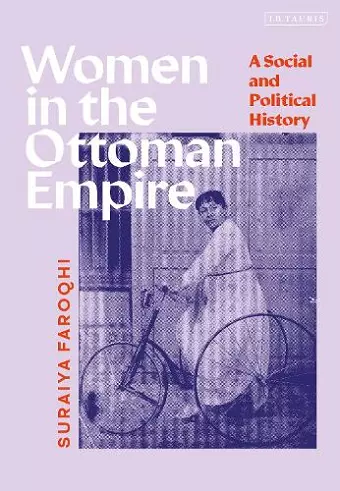Women in the Ottoman Empire
A Social and Political History
Format:Paperback
Publisher:Bloomsbury Publishing PLC
Published:23rd Feb '23
Should be back in stock very soon

This book explores the diverse roles and agency of women in the Ottoman Empire, highlighting both elite and non-elite experiences throughout history.
In the Ottoman Empire, a complex social hierarchy existed, categorizing individuals into 'first-class' and 'second-class' subjects. Adult Muslim males held the highest status, while all others—including Muslim boys, women, townspeople, peasants, and nomads—were considered second-class citizens. Elite women, despite facing limitations compared to their male counterparts, often enjoyed better life chances than ordinary women. However, they too were subject to the same risks associated with pregnancy, childbirth, and diseases that plagued women across various social strata. Understanding the experiences of Ottoman women is crucial for a comprehensive view of the empire's societal structure.
Women in the Ottoman Empire presents a pioneering exploration of women's roles and agency throughout the history of the empire, from the early-modern period until its dissolution in 1918. Suraiya Faroqhi intricately weaves the narratives of women from diverse backgrounds—socially, religiously, and ethnically—into the broader historical context. The thematic chapters delve into various aspects of women's lives, including urban existence, family dynamics, work, education, and their resilience amidst war.
This book serves as an essential resource for scholars and students alike, providing insights into how women navigated the constraints imposed by their societies. With a timeline and an extensive further reading section, Women in the Ottoman Empire is an invaluable addition to the study of Ottoman history and the history of women in the Middle East.
A remarkable book that masterfully traces the changes in the condition féminine during the early modern and modern periods. With a tremendous command of primary sources and the secondary literature, Faroqhi covers all the themes in the field by providing a fascinating panorama of the history of Ottoman women through the perspective of women’s agency. * Betül Ipsirli Argit, Marmara University, Turkey *
Women in the Ottoman Empire is a unique product of Suraiya Faroqhi’s decades of experience. On the one hand, it provides a striking overview of the body of Ottoman/Middle Eastern women’s studies, and on the other, it enriches the field with a touch that embraces the cultural, religious, social, and ethnic diversity of the empire. The book is an ideal introduction for newcomers to the field and a source of pride for experienced researchers, reflecting the existing scholarship. * Yahya Araz, Dokuz Eylül University, Turkey *
[Women of the Ottoman Empire] constitutes a seminal contribution to the field not only of the history of women, but to Ottoman history in general. Based on an immense knowledge of the historiography and on precise, first-hand research in a series of archives, it proposes innovative interpretations and opens new research perspectives … [T]he book remains a fundamental basis for understanding not only the place of women, but also the nature of the Ottoman Empire. * CEU Review of Books *
A highly insightful, well-informed and far-reaching study that has definitely pioneer status … Faroqhi masterfully evokes voices that have long been denied their linguistic space. * WZKM *
Each chapter presents a series of compelling case studies, drawing upon both primary and secondary sources, and is articulated in a manner that is both captivating and engaging. * International Review of Social History *
Faroqhi’s book is a significant and timely contribution to Ottoman women’s history. Its broad chronological, geographical, and thematic scope makes it an essential resource for students and scholars in the field. By focusing on women’s agency and survival strategies, the book not only expands our understanding of Ottoman women’s lives but also invites further discussion on the intersections of gender, power, and historical change. * Bulletin of the School of Oriental and African Studies *
Women in the Ottoman Empire is a masterful exploration that not only unveils the diversity and agency of Ottoman women but also challenges established historical narratives. Suraiya Faroqhi’s ability to navigate the complex web of women’s experiences, her inclusion of rich case studies with specific examples, and her rigorous scholarly approach makes this book an essential resource for Ottoman historians, gender scholars, and anyone intrigued by the profound intricacies of women’s lives in historical contexts. * Diyâr, Journal of Ottoman, Turkish and Middle Eastern Studies *
Women in the Ottoman Empire provides an informative and comprehensive survey of Ottoman women’s strategies of empowerment and survival. It does this by tracing how family relations, social aid and paid work occasionally opened spaces for women from the 16th to the early 20th centuries, as well as the structural constraints that limited those occasions. It would be particularly helpful for those looking for a guide to the sources available to students of women and gender in the Ottoman Empire and the most prominent topics of inquiry and debates in the scholarly literature. The book’s discussion of the limitations of the existing historical data and the questions that remain due to those limitations would be especially useful for newcomers to the field who would like to learn about the gaps in the scholarship. * Turkish Area Studies Review *
[Women of the Ottoman Empire] is as thorough and comprehensive a study of women in the Ottoman Empire as the subject, in its present state of development, permits. It provides us with a masterly conspectus of what we know, while at the same time pointing researchers to fields yet to be explored. * Colin Imber, Journal of Islamic Studies *
ISBN: 9780755638260
Dimensions: 242mm x 168mm x 18mm
Weight: 588g
328 pages